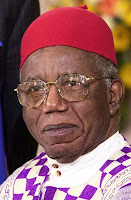African Fiction/Poetry; Things Fall Apart
Classroom:
Please complete presentations on gender.
Then, let's discuss the novel Things Fall Apart by Chinua Achebe.
There are a variety of allusions in Things Fall Apart that you may wish to know about. The first is the title, which refers to William Butler Yeats poem The Second Coming. As you read, consider the connection of central themes between the book and the poem.
Themes and motifs in Achebe's writing include traditions of Igbo or African society, the effect of Christian influences on said culture, and the clash between Western thinking and African values during (and after) the colonial period. Things Fall Apart includes the confrontation of gender (masculinity versus femininity) and colonialism.
Things Fall Apart has become one of the most important books in African literature. Selling over 8 million copies around the world, making Achebe the most translated and significant African writer of his time.
Along with poetry, essays, criticism, and children's books, Achebe has written:
- Things Fall Apart (1958)
- No Longer at Ease (1960)
- Arrow of God (1964)
- A Man of the People (1966)
- Anthills of the Savannah (1987)
- Bill Moyer's interview with Chinua Achebe
- CNN Interview (Achebe discusses writing)
- An Evening with Chinua Achebe (Library of Congress video)
- Things Fall Apart film (scene 1)
- A quick video on the Colonialism in Africa (3 minutes)
- Colonialism in Nigeria narrated by Chinua Achebe
- Nigerian Civil War (1967-1970)
Nadine Gordimer (1923-2014)
South African writer Nadine Gordimer won the Nobel Prize for Literature in 1991.
Face to Face (1949) (collection of short stories)
The Lying Days (1953)
A World of Strangers (1958) (banned in South Africa)
The Conservationist (1974) (won the Booker Prize for Fiction--the highest literary honor in Britain)
The Late Bourgeois World (1976) (Also banned in South Africa)
What Happened to Burger's Daughter (1979) (banned)
July's People (1981)
Crimes of Conscience (1991)
The House of Gun (1998)
Get a Life (2005) (about the death of her husband and her grieving process)
Beethoven was 1/16 Black (2007) (short stories)
In 1990, the South African government recognized the African National Congress as a legal opposition party that soon led to the 1990 release of Nelson Mandela from prison. One of the first people Mandela asked to see after his release was Nadine Gordimer.
With time remaining, let's read a little African literature. See instructions for creative responses.



HOMEWORK: Complete the handout readings/writing.
With time remaining, let's read a little African literature. See instructions for creative responses.



HOMEWORK: Complete the handout readings/writing.





Comments